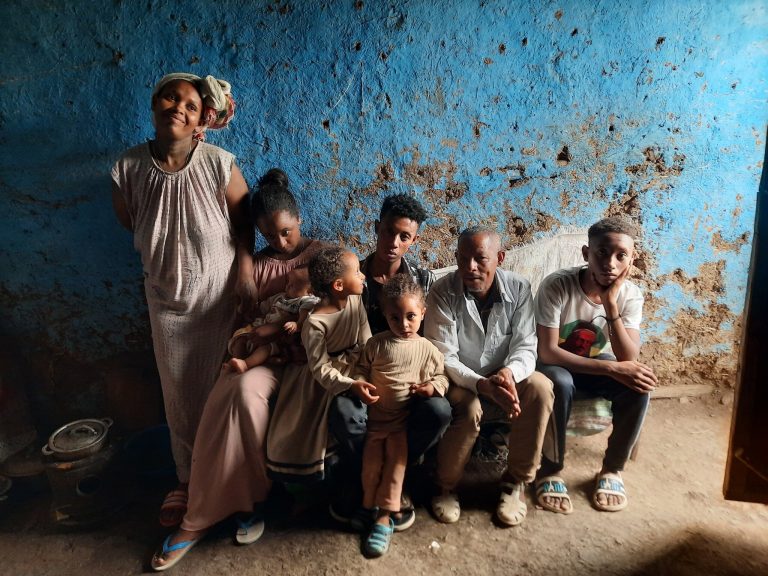
A wave of new immigrants is underway, but many activists say the piecemeal operation only prolongs the saga and provides false hope to those who will never be let into Israel.
By AMY SPIRO
GONDAR, Ethiopia
Kefale Tayachew’s parents moved to Israel 23 years ago. Since then, he has hoped and prayed to join them. He uprooted his life from an Ethiopian village and settled into a cramped and difficult existence in Gondar, awaiting notice that he would be allowed to move to Israel.
Last year, Tayachew’s father died in Israel, after the two had seen each other just once in 23 years, during a visit in Ethiopia around seven years ago. Earlier this month, after decades of waiting, Tayachew, 56, his wife and their six children – ranging in age from 23 to 4 months – arrived in the Jewish state aboard the first aliyah flight from Ethiopia in more than a year. Aliyah refers to Jewish immigration to Israel.
“For 23 years, I sat here and waited because I believe in God, and God does not betray his people,” he told a small group of reporters in his one-room home in Gondar, days before the flight that finally brought him to the Jewish state. “I’m part of the Jewish people.”
Tayachew said he does not know where he will live or what work he will find in Israel, but it doesn’t matter: “All I want is to arrive in Israel, to kiss my mother,” he said via a translator.
Three days before the flight, he said he had yet to inform his mother, who lives in Netanya, that he had been granted approval to immigrate.
“I didn’t tell her. I want her to see that I really have made aliyah,” he said, following decades of delayed promises and false hopes. Tayachew said he planned to call her when the family reached Addis Ababa the day before the flight to Tel Aviv.

But aboard the plane to Israel, he said he had still not informed her that he was finally on his way – preferring to wait until his feet touched the ground and his 23-year dream was realized.
“I knew if I waited it would happen,” he said before the flight. “I will never in my life lose hope because the God of Israel doesn’t allow the loss of hope.”
Despite his deep faith, Tayachew’s reluctance to tell his mother he was set to arrive is understandable. Decades of dashed promises, false starts and long-delayed dreams have plagued the Jewish community in Gondar. The vast majority of the community there belongs to a group known as “the waiters,” those who have been living in limbo for years hoping and dreaming of reaching the Holy Land.
“People really believed that their sons, their mothers, their sisters, will make aliyah right after them, because they were told that by the [Israeli] Interior Ministry,” said Yerus Yatmin Maharat, an attorney and the spokesperson for the Struggle for Aliyah of Ethiopian Jews activist group. “They told them soon they will be making aliyah.”
But many families waited years, if not decades, to reunite. And though thousands of Ethiopian immigrants are set to arrive this year, even more will once again be left behind, unsure if they will ever be able to join their family members in Israel.

Tayachew and his family fulfilled their dream aboard a flight of 181 new immigrants from Ethiopia on June 1. A day later, another 160 touched down in Tel Aviv to begin new lives in the Jewish state, and the next such flight is scheduled for June 21.
In total 3,000 Ethiopians were approved to come to Israel under a government decision from November, which also budgeted NIS 570 million for their absorption. Unlike those who qualify to immigrate under the Law of Return – which grants citizenship to anyone with at least one Jewish grandparent – those arriving on the Jewish Agency-organized flights from Addis Ababa qualify under the Law of Entry.
Every new immigrant must be individually approved by the Interior Ministry to have met a certain set of criteria. Most have parents or children already living in Israel, while some have siblings there (and for the first time, those who had parents who moved to Israel and later died are also eligible). All of the new immigrants agree to undergo a 10-month process of conversion to Judaism; if they do not complete it, they are not granted full citizenship but can remain as permanent residents.
Decades in the making
In the 80s and early 90s, around 50,000 Jews from Ethiopia known as the Beta Israel community were brought to Israel in mass airlifts. Since then, there have been several government decisions to bring over groups of those left behind, often referred to as the Falash Mura – those who in the past converted to Christianity due to coercion or fears of persecution. While most have returned to practicing Judaism, the state does not view them as Jewish enough to qualify for the Law of Return.
Over the years, the government has repeatedly declared the end of aliyah from Ethiopia, and yet it has also repeatedly walked back that declaration, continuing to bring over groups of those still waiting to reunite with their family members.

Just how many remain behind who fit the government’s criteria? That figure is subject to serious debate.
In 2015, the Israeli government approved the immigration of 9,000 Ethiopians, said to be all the remaining Falash Mura known to Israel. But over the next five years, only around 2,500 were brought to Israel in sporadic and often long-delayed airlifts.
In 2020, Immigration and Absorption Minister Pnina Tamano-Shata said there were 8,000 Ethiopians waiting to immigrate. Since then, 2,000 immigrated to Israel in the first half of Operation Tzur Yisrael (Rock of Israel).
But today, Jewish Agency officials estimate that around 10,000 people in Ethiopia are “waiting” to immigrate to Israel – around 7,000 in Gondar and 3,000 in Addis Ababa. How does that all add up?
“The problem is not the math – the problem is that the numbers, especially in Gondar, are not final,” said Shay Felber, director of the Jewish Agency’s Aliyah and Absorption Unit, during a conversation in Gondar ahead of the first flight — part of Tzur Yisrael part 2. “We know of the people who are registered and are part of the community. But there may be others in the surrounding areas.”
Since 2014, Felber said, Israel is only considering applications from those who have family members in Israel who have reached out to the Interior Ministry. The Jewish Agency said the accurate number of applicants is known only to the Interior Ministry. The Interior Ministry said the figure was actually held by the Population, Immigration and Border Authority. A spokesperson at PIBA said it did not have a full list of those who have applied, and declined to elaborate.
Yatmin Maharat, who was born in Israel to Ethiopian immigrants, said it makes sense that the figures continue changing as people wait years to immigrate, many having children in the meantime.
“If the State of Israel had stood behind its [2015] decision, we wouldn’t be in this situation now,” Yatmin Maharat said. “Breaking up families is a direct result of the policy of the State of Israel… I don’t see the problem going away if it’s not solved in one fell swoop.”
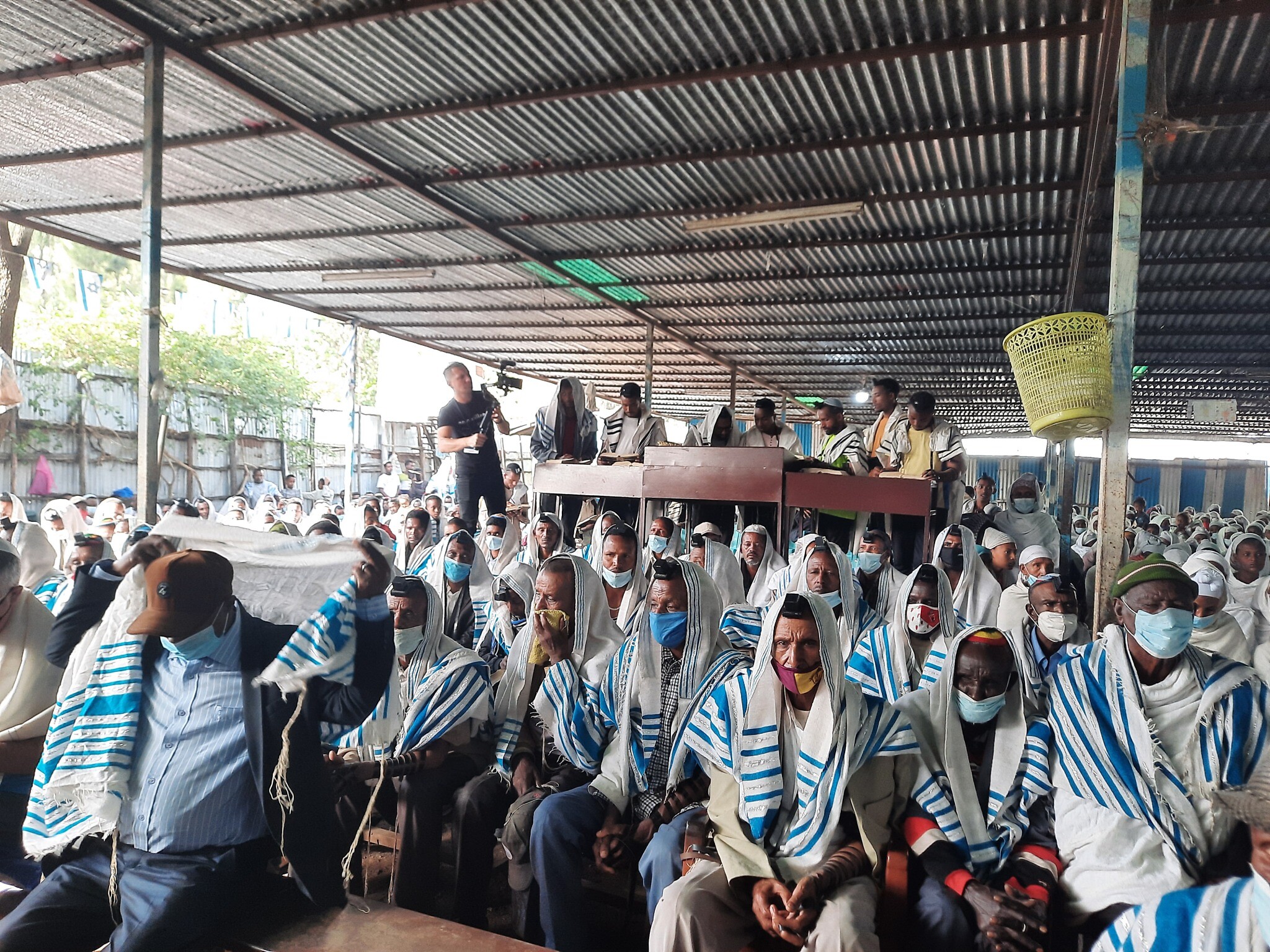
False hopes
On the first day of the Hebrew month of Sivan — on May 31 this year — hundreds of worshipers packed into the synagogue in Gondar for Rosh Hodesh prayers. The sea of men, women and children took part in the festive prayers, capped by a moving rendition of “Hatikvah,” the Israeli national anthem.
None of those in the crowd were aboard the flight to Israel the following day. Many are unlikely to ever move to Israel, not qualifying under the criteria laid out by the government.
Following the service, Jewish Agency interim chairman Yaakov Hagoel addressed the crowd in remarks translated into Amharic.
“I hope, next year, you will all be with us in Jerusalem,” Hagoel told the group of worshipers.
Minutes after Hagoel’s speech, Micha Feldman, the legendary former Jewish Agency emissary to Ethiopia who oversaw Operation Solomon in 1991, was less than impressed.
“What was said here creates a lot of illusions,” Feldman told The Times of Israel outside the synagogue. “It’s very tempting to say,” he added, but it merely serves to provide false hope.
“Not all of them are eligible, not all of them will be eligible,” he added. “There are certain criteria that most of the people, even those who went into the synagogue this morning, will not meet.”
Adane Tadela, the current chief Jewish Agency emissary to Ethiopia, was understandably more diplomatic.
“That’s what he believes; it’s his perspective, his faith,” said Tadela of Hagoel’s speech. “He spoke what he feels.”
Hagoel is holding the position temporarily while the search for a new permanent chair of the Jewish Agency drags on, bogged down by politics and the requirement for nine out of 10 members of the executive board to agree on a candidate.
And as the current government teeters on the brink of collapse, politics will undoubtedly play a role in the future of Ethiopian aliyah. Activists say it is unlikely that the current wave of immigration – and the one that began in 2020 – would have been possible without Tamano-Shata, who fought an uphill battle to approve the decision.
“I don’t think it would have happened if she wasn’t there,” said Yatmin Maharat. “But not everything is within her control.”
Political casualties
Unlike some previous government decisions approving Ethiopian aliyah, the ruling in November included funding, making it more likely to be upheld even if the government falls.
“Usually when there are elections there are concerns, but the minister really fought and ensured a budget for the decision,” said Yatmin Maharat. “Because it’s budgeted, it should be something that actually happens, but you can never know for sure.” If the Interior Ministry holds up approving immigration visas for any reason, then the operation will be forced to halt.
As a member of Blue and White, Tamano-Shata — the first Ethiopian-born member of an Israeli cabinet — is one of the few ministers who served in both the current and previous governments. But as the political future hangs in the balance, it is unclear who may be holding her position in just a few months.
While the 3,000 immigrants approved last year under government decision 713 are likely to arrive regardless of any election, the other elements of the ruling – designed to put an end to the issue of Ethiopian aliyah once and for all – are a lot less likely to come to fruition.
“We worked very hard for this government decision. After the negotiations with [Interior] Minister Ayelet Shaked, sometimes it was very hard to sit on the chair and to negotiate with them,” Tamano-Shata said at a speech in Addis Ababa earlier this month, the evening before the first flight of the new wave landed in Israel. “But I think God put me in this place. And I had to not be only angry, I had to be proactive.”
She also reiterated her belief that the government must make a final decision on who in Ethiopia is eligible for aliyah and who will not ever be granted citizenship in Israel, and “for once to stop the saga and bring a solution.”
While the November cabinet decision budgeted for the absorption of 3,000 new immigrants, it also ordered the creation of a team and the appointment of a project manager to “formulate a comprehensive outline for concluding the issue of those waiting in Addis Ababa and Gondar.” It also called for the future approval of a budget to bring over those who met the criteria but did not fall under the 3,000 cap.
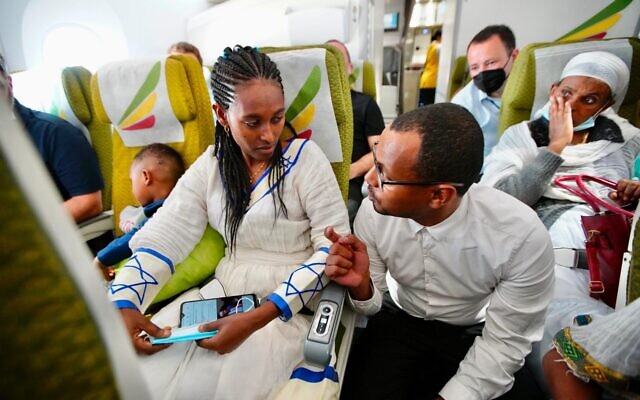
More than six months after the ruling was issued, no team was convened, no project manager was appointed and the likelihood of any of that happening in this current government is close to nil. But most activists believe that putting a final end to such Ethiopian aliyah is the most humane approach.
“We have to be brave enough to say to those who are not eligible, ‘you won’t make aliyah, we’re sorry,’” said Avtamo Yosef, the head of the department of Ethiopian immigration in the Jewish Agency. He suggested there is a powerful message sent in “having a minister from within the Ethiopian community saying in a firm way that we have to put an end to it eventually.”
Breaking the family chain
The stated goal of this wave of aliyah — and its enumerated criteria — is to reunite family members. Yet many if not most of the new immigrants are still leaving loved ones behind.
Zemenu Atalele, 30, hadn’t seen his mother in 10 years, since she moved to Israel and settled in Beersheba. None of the three children he shares with his wife, Yeshihareg, has ever met their grandmother.
“I am part of the nation of Israel and I want to reunite with my family there,” Atalele said in his dusty one-room apartment in Gondar, days before he boarded a flight to the Jewish state.
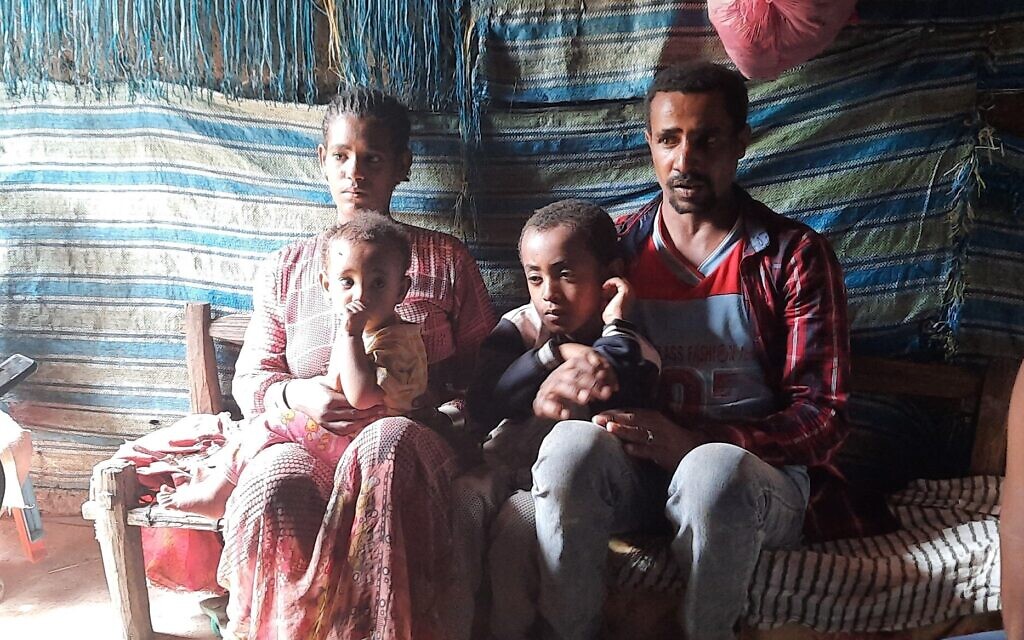
Asked what kind of career he wants to pursue in Israel, he said that “all that matters is seeing my mother.”
But reuniting with his mother means leaving behind his father and four brothers – on his father’s side – in Ethiopia. Atalele said once he arrives in Israel, he hopes that he can work to bring them over as well.
“It’s very hard to break the chain of family in the middle,” said Jewish Agency COO Yehuda Setton. “The question is, where do you stop it?”
“There is no one solution,” he added, noting that for years, if not decades, many in Ethiopia have been told they will one day be eligible for aliyah. “It is very, very complicated.”
The long waits endured by many have forced them to place their lives on hold. Unsure if the call to make aliyah could come at any moment, many work as day laborers, and have trouble holding on to long-term housing. Many left behind easier lives in villages, working in agriculture, to live near the Jewish Agency center in Gondar and the synagogue, hoping the proximity will ease the immigration process.
For some, the state of uncertainty has left their personal lives in limbo.
Earlier this month, Teshager Gerem, 63, his wife Alemitu, 60, and their seven adult children arrived in Israel, reuniting with the family’s two older daughters who moved 17 years ago.
None of the children, who range in age from 35 to 17, are married or have children, since they said they were afraid such a move would prevent them from moving to Israel. The government criteria state that any Ethiopian who is found eligible for aliyah can bring their spouse, their minor children, and any children over age 18 who have not married or had children.
“We were happy that our daughters moved to Israel, because it gave us hope that we would join them,” said the family’s patriarch shortly before the flight.
Their oldest son, Chalachew, 35, said the wait still took its toll on the family: “We feel a little sadness, because we’re waiting so long,” he said. “Sometimes we feel angry.”
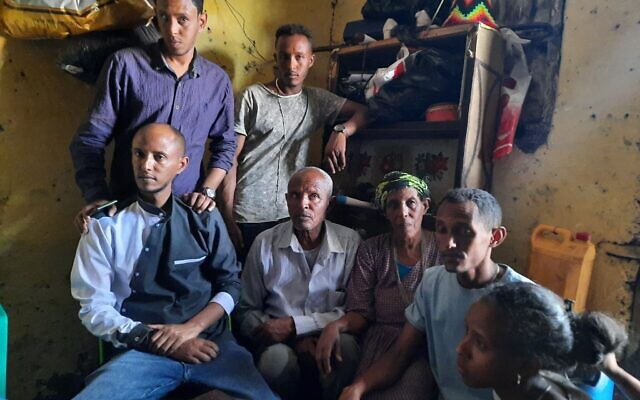
At the time of the first aliyah flight in this wave on June 1, close to 1,000 Ethiopians had already been granted their final approval to move to Israel, and will arrive soon once the bureaucracy is wrapped up and the plane secured. The remaining 2,000 are expected to arrive by November, if an Israeli election does not hold them up.
But the rest of the community will continue to wait in limbo, not knowing if they will ever get the call saying their application has been approved.
Yatmin Maharat said she is not optimistic about the fate of the remaining thousands of Jews in Ethiopia. But she vows to never end the struggle to bring them to Israel.
“You can’t give up hope, and we as activists will fight until everyone is here,” she said. “You don’t just forget a brother, you don’t forget your mother, your grandmother.”
_________________
Courtesy: Times of Israel